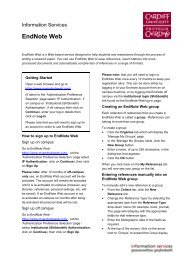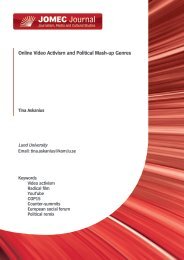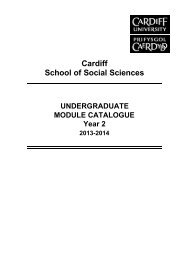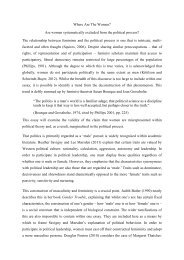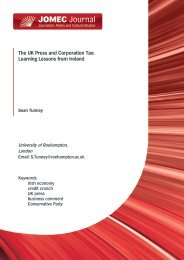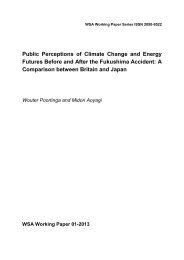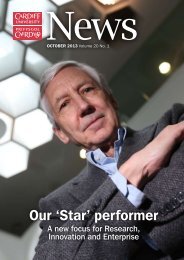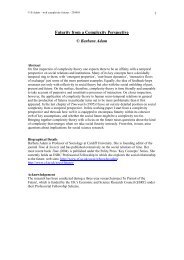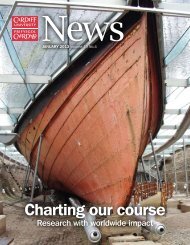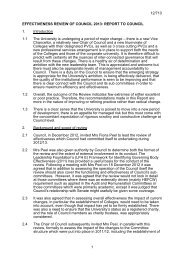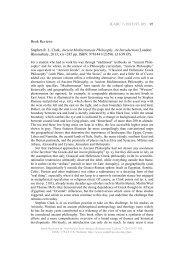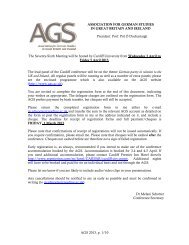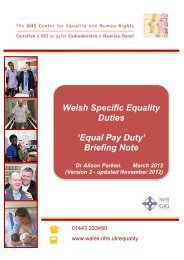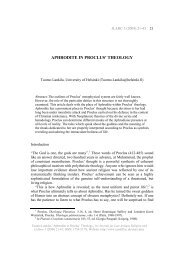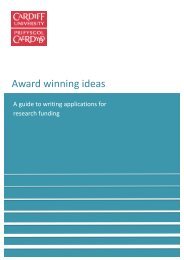Seeing through HIV's disguises - Cardiff University
Seeing through HIV's disguises - Cardiff University
Seeing through HIV's disguises - Cardiff University
Create successful ePaper yourself
Turn your PDF publications into a flip-book with our unique Google optimized e-Paper software.
RESEARCH: HEAlTH RoUNd-Up<br />
SARTRE launches<br />
a new philosophy<br />
for Medicine<br />
<strong>Cardiff</strong> and Bristol Universities<br />
have joined forces in an<br />
unique alliance aimed at<br />
accelerating the translation of medical<br />
research into new treatments and<br />
therapies to benefit patients.<br />
The Severnside Alliance for<br />
Translational Research (SARTRE)<br />
has just secured more than £2M<br />
in funding from the Medical<br />
Research Council. This will build<br />
the infrastructure to allow more<br />
research projects at both Universities<br />
to move forward in the translational<br />
pipeline and facilitate partnerships<br />
with industry. It will also create<br />
the opportunity for more individual<br />
projects to bid for Research Council<br />
funding under its Developmental<br />
Pathway Funding Scheme (DPFS).<br />
A keystone of the new Alliance will<br />
be the creation of a new Professor<br />
of the Practice of Translational<br />
Research. This will be a joint<br />
appointment, acting as a “talent scout”<br />
to identify research projects suitable<br />
for development and also engaging<br />
with industry and the biotechnology<br />
sector to facilitate translation.<br />
The postholder will work with<br />
two new Translational Operations<br />
Managers, one for each institution,<br />
who will ensure that resources are<br />
in place and appropriately targeted<br />
to support translational research<br />
projects. They will project-manage<br />
individual bids and guide researchers<br />
<strong>through</strong> the regulatory, intellectual<br />
property, ethical and research<br />
governance frameworks.<br />
The Alliance also received funding<br />
(£600K) under the Developmental<br />
Pathway Funding Scheme (DPFS)<br />
portfolio to establish a facility for<br />
production of proteins in sufficient<br />
There’s so much going on…<br />
<strong>Cardiff</strong> News contains only a<br />
fraction of the <strong>University</strong>’s news<br />
output, the majority of which is<br />
published at www.cardiff.ac.uk/<br />
news Here are just a few of the<br />
recently featured items.<br />
4<br />
quantity and quality for proof of<br />
concept testing and biological process<br />
development.<br />
The facility will be housed at <strong>Cardiff</strong><br />
<strong>University</strong>, Central Biotechnology<br />
Services (www.cardiff.ac.uk/medic/<br />
cbs) and help researchers overcome<br />
what can be a serious bottleneck<br />
preventing project development.<br />
The Alliance aims to<br />
bring forward projects<br />
right across the range of<br />
diseases and conditions<br />
tackled by experts at both<br />
Universities, combining<br />
significant strengths in<br />
patient cohorts across<br />
the region.<br />
Areas already identified for priority<br />
alliances include:<br />
• Colorectal and hematopoetic<br />
cancers<br />
• Early vascular disease and<br />
hypertension<br />
• Neuropsychiatric illnesses<br />
• Immunological and cell-based<br />
therapies<br />
Professor Paul Morgan, the Dean<br />
of Medical Research at the School<br />
of Medicine, <strong>Cardiff</strong> <strong>University</strong><br />
said: “This award and the creation<br />
of SARTRE is great news for<br />
medical researchers, who should<br />
find swifter pathways to bring their<br />
projects to commercial development.<br />
Furthermore, it is good news for<br />
patients, as pioneering treatments and<br />
therapies will become available more<br />
rapidly.”<br />
Dental Annexe: The First Minister for<br />
Wales, Rhodri Morgan, has opened newly<br />
modernised teaching and administrative<br />
facilities at the School of Postgraduate<br />
Medical and Dental Education. They will<br />
bring together staff and students within<br />
the dental section on one site for the first time. Full<br />
story at: www.cardiff.ac.uk/news/dentalannexe<br />
Easing arthritis pain<br />
Arthritis sufferers might find some<br />
relief in a new compound found<br />
to ease bone damage in mice by<br />
researchers at the School of Medicine<br />
and colleagues.<br />
The laboratories of Dr Eddie<br />
Wang, a senior lecturer in Medical<br />
Biochemistry, and Dr Anwen<br />
Williams (Rheumatology) found<br />
that mice lacking a protein molecule<br />
called Death Receptor 3 (DR3) are<br />
freed from the bone damage usually<br />
caused by arthritis.<br />
Patients with rheumatoid arthritis are<br />
more likely to have extra copies of the<br />
gene that codes for DR3. Perhaps of<br />
even greater significance, treatment<br />
with an antibody that blocked the<br />
binding of DR3 to its specific binding<br />
partner TL1A significantly reduced<br />
joint pathology, providing proof-ofprinciple<br />
of a potential therapy.<br />
New gum disease<br />
bacteria found<br />
A new species of oral bacteria has<br />
been found by School of Dentistry<br />
researchers working with colleagues<br />
in London.<br />
The bacteria, named Prevotella<br />
histicola, could contribute to gum<br />
disease and tooth decay and could<br />
help us understand how mouth<br />
problems develop. They have also<br />
been linked to infections in other<br />
parts of the body. The findings<br />
were reported in the International<br />
Journal of Systematic and<br />
Evolutionary Biology.<br />
The mouth is host to hundreds of<br />
different species of bacteria, many<br />
of them still unknown. Three<br />
strains of the bacteria were isolated<br />
from tissue specimens taken from<br />
patients with oral cancer at the<br />
Dental School, as part of a study<br />
to determine what, if any, bacteria<br />
were living inside mouth tumours.<br />
Laboratory tests have also shown how<br />
DR3 might also induce the development<br />
of bone destroying cells in humans.<br />
Dr Wang, of the School’s Infection<br />
Immunology and Inflammation (I3)<br />
Research Group, said: “A few stones<br />
remain unturned in the hunt for the<br />
proteins which cause bone damage,<br />
as blocking DR3 didn’t eliminate<br />
bone destruction altogether. However,<br />
it did reduce a lot of the damage,<br />
suggesting DR3 plays an important<br />
part in the onset of disease. It could<br />
therefore be an important target in the<br />
treatment of rheumatoid arthritis and<br />
other diseases where disrupted bone<br />
physiology is seen.”<br />
The research was carried out with<br />
colleagues at the <strong>University</strong> of<br />
Southampton. The findings have<br />
been published in the Journal of<br />
Experimental Medicine.<br />
From DNA analysis the <strong>Cardiff</strong><br />
team of Dr Sam Hooper and Dr<br />
Melanie Wilson realised that these<br />
strains didn't match any known<br />
species. Their collaborators at the<br />
King's College Infection Research<br />
Group confirmed this with an array<br />
of biochemical and physiological<br />
tests. The tests showed that the<br />
novel species was part of the<br />
Prevotella family of bacteria, which<br />
are known to cause many different,<br />
painful infections in the mouth and<br />
other body sites.<br />
Dr Hooper, of the School’s Oral<br />
Microbiology Group, said:<br />
“We suspect this new species<br />
might also play a role in disease.<br />
Discovering more of these<br />
unrecognised bacteria is important<br />
as it gives us a better picture of how<br />
oral diseases, such as tooth decay<br />
and gum disease, are caused and<br />
thus how they might be treated.”<br />
Dr Who: The 45th anniversary<br />
of Doctor Who is to be marked<br />
with an academic conference, the<br />
‘Whoniversal Appeal’ , which will<br />
examine issues of morality, history,<br />
philosophy, fan culture, sexuality,<br />
and technology which surround the hit science fiction<br />
series. Full story at: www.cardiff.ac.uk/news/drwho



